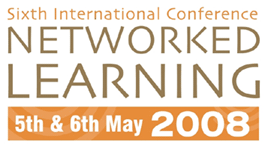

Exploring Patterns of Student Learning Technology Use in their Relationship to Self-Regulation and Perceptions of Learning Community
Ruslan Ramanau, Rhona Sharpe and Greg Benfield
Oxford Centre for Staff and Learning Development, Oxford Brookes University,
ruslan.ramanau@brookes.ac.uk, rsharpe@brookes.ac.uk, gdbenfield@brookes.ac.uk
Abstract
Learning technologies play an increasingly important part in higher education instruction worldwide. Recent learner studies in the UK discovered an underworld of learning technology use which is integral to student lives. They showed that students make sophisticated use of an increasing range of educational media and are capable of customising and personalising learning technologies provided to them by their institutions to suit their needs. Evidence from research in the United States and Germany suggest that similar trends are common to other contexts internationally.
Today’s learners actively construct their learning process, regulate
and adapt both their behaviour and the study context to the demands of
their studies. This is an agreement with the self-regulated learning tradition
of research on learning, which assumes that learners can monitor, control
and regulate their cognition, motivation or behaviour and their self-regulatory
activities mediate the impact of personal and contextual characteristics
on performance. Although attempts have been made to take account of the
influence of learning technology on learner conceptions of learning, much
of previous research on learner uses of technology was descriptive and
failed to relate its findings to literature on approaches and conceptions
of learning, including research on self-regulation.
The present research was part of a larger multi-method research project
aimed to evaluate learner experience of e-learning at Oxford Brookes University
and supported by the Higher Education Academy in the UK. The qualitative
stage of the study was intended to evaluate student experience of the
use of social software, e-portfolios, personal learning environments and
virtual environments for reflective learning and personal development
planning. The quantitative part of the project aimed to investigate patterns
in online technology use in their relationship to self-regulation, learner
perceptions of independence in learning and learning community and some
of its results are presented here.
A 47-item self-report questionnaire comprising of a set of Likert-like statements was designed to address the key goals of the study. Some of the items were used in the JISC LXP student experience study and others were developed by the project team from an initial item pool that was partly based on the results of qualitative evaluation. To explore learner self-regulatory activities, help-seeking, time management and peer learning scales of the Motivated Strategies for Learning Questionnaire (MSLQ) were used. To measure learner perceptions of choice in learning and learning community, learner choice and learning community scales of the CEQ were used.
Paper and online versions of the instrument were administered to the representative sample of students at Oxford Brookes University in the UK in the period of four weeks in October through November 2007. The results of analysing the data obtained from the online version of the questionnaire show that students varied in the degree to which they are engaged in various online activities: while multimedia and learning resource use have been reportedly quite high, the use of some of the more popular Web 2.0 services (such as social bookmarking) and virtual worlds appeared to be rather low. The results of factor analysis helped to identify five dimensions of online media use, but only two of them (“Web for authoring” and “Web for multimedia use”) were correlated with scores on peer learning and help-seeking scales. Perceptions of learning community were positively related to student use of online resources and student views on choice in learning were not associated with scores on any of the five first-order factor based scales. The paper concludes with the discussion of the implications of the study for learning technology research and practice.
| About NLC |
2008 Conference Papers
| Conference Committee| Keynote
Speakers
| Papers from previous NL conferences |Research Seminars| Current Conference
| Sponsors | Contact
|
